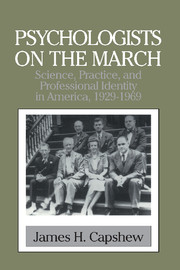Book contents
- Frontmatter
- Contents
- Acknowledgments
- List of Abbreviations
- Introduction: The Psychologists' War
- Interlude I
- 1 Growing Pains: After the Great War
- 2 Mobilizing for World War II: From National Defense to Professional Unity
- 3 Home Fires: Female Psychologists and the Politics of Gender
- Interlude II
- 4 Sorting Soldiers: Psychology as Personnel Management
- 5 Applied Human Relations: The Utility of Social Psychology
- 6 From the Margins: Making the Clinical Connection
- 7 Engineering Behavior: Applied Experimental Psychology
- Interlude III
- 8 A New Order: Postwar Support for Psychology
- 9 Remodeling the Academic Home
- Interlude IV
- 10 The Mirror of Practice: Toward a Reflexive Science
- 11 Beyond the Laboratory: Giving Psychology Away
- Interlude V
- Epilogue: Science in Search of Self
- Index
6 - From the Margins: Making the Clinical Connection
Published online by Cambridge University Press: 06 July 2010
- Frontmatter
- Contents
- Acknowledgments
- List of Abbreviations
- Introduction: The Psychologists' War
- Interlude I
- 1 Growing Pains: After the Great War
- 2 Mobilizing for World War II: From National Defense to Professional Unity
- 3 Home Fires: Female Psychologists and the Politics of Gender
- Interlude II
- 4 Sorting Soldiers: Psychology as Personnel Management
- 5 Applied Human Relations: The Utility of Social Psychology
- 6 From the Margins: Making the Clinical Connection
- 7 Engineering Behavior: Applied Experimental Psychology
- Interlude III
- 8 A New Order: Postwar Support for Psychology
- 9 Remodeling the Academic Home
- Interlude IV
- 10 The Mirror of Practice: Toward a Reflexive Science
- 11 Beyond the Laboratory: Giving Psychology Away
- Interlude V
- Epilogue: Science in Search of Self
- Index
Summary
In 1940, Chauncey McKinley Louttit (1901–1956), a clinical psychologist from Indiana University, sought and received a commission from the U.S. Navy. As the navy's first psychologist, he hoped that war work would provide a way out of his professional frustrations. Louttit had done much to advance the cause of clinical psychology during the 1930s and was eager to broaden his already extensive networks. The author of a standard textbook in the field, published in 1936, he was involved in the founding of the American Association for Applied Psychology in 1937 and was serving as executive secretary of the group.
Louttit, trained as a comparative psychologist under Robert Yerkes in the late 1920s, was ambivalent about making a career in clinical psychology and entered the field reluctantly after graduate school as a temporary employment expedient. His career illustrates the marginal status of clinical psychology before World War II.
Louttit's first paid employment in psychology prefigured his later career. After receiving his bachelor's degree from Hobart College in 1925, he became an assistant to Stanley D. Porteus, director of research at the Vineland Training School for the Feebleminded, in New Jersey. Earlier, under Henry H. Goddard, Vineland had become one of the first sites for the use of psychological tests for the diagnosis and treatment of mental problems. After several months, Porteus recommended Louttit to Robert Yerkes for a graduate assistantship at Yale. The timing was fortunate.
- Type
- Chapter
- Information
- Psychologists on the MarchScience, Practice, and Professional Identity in America, 1929–1969, pp. 128 - 142Publisher: Cambridge University PressPrint publication year: 1999



